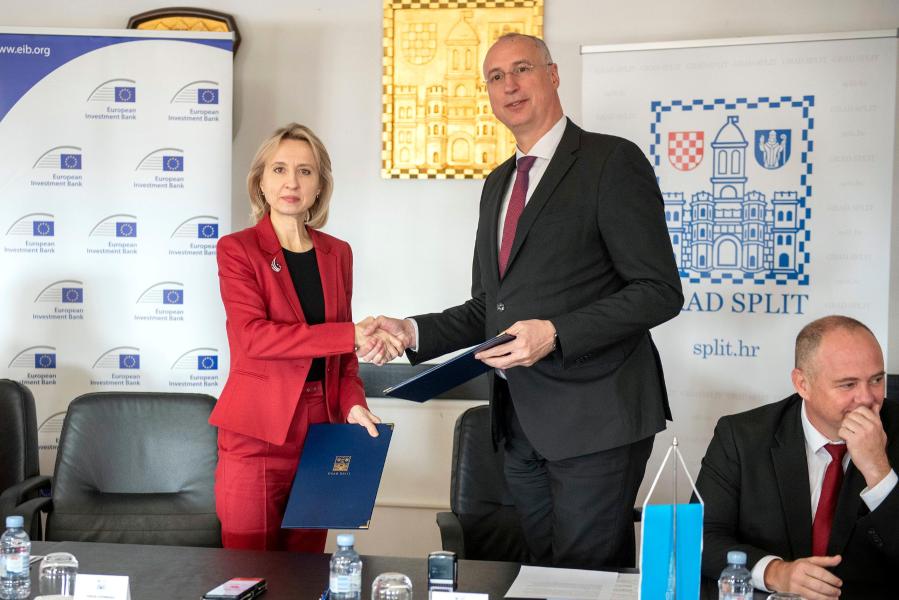
- The deal comes under a €150 million framework loan approved by the EIB for the City of Split.
- The financing will underpin Split’s multi-sector investment programme.
- It will fund public infrastructure investments to improve services and quality of life, and support green transformation.
The European Investment Bank (EIB) has signed a €49 million loan with the City of Split to co-finance its 2023-2027 multi-sector investment programme to overhaul public infrastructure. The operation will help provide better public services in Croatia’s second largest city and enhance the quality of life of its 180 000 residents.
This is the EIB’s first flagship municipal operation in Croatia, with this transaction granting the first tranche under a €150 million framework loan agreement with the City of Split. It will foster integrated sustainable urban renewal and development by renovating public buildings, improving urban mobility and upgrading open public spaces and green areas.
“Providing better public services to Europeans and making their environment more pleasant and sustainable is a priority for the EIB, the EU climate bank,” said EIB Vice-President Teresa Czerwińska. “We are very happy to support the City of Split in its drive to make Croatia’s second largest city a better place to live and do business. The investments that the city is planning will certainly contribute to the green development of urban infrastructure and improve the quality of social services, such as public schools and kindergartens, thereby making the lives of Split’s residents more comfortable.”
The agreement will help Split absorb EU grants faster, improve the city’s attractiveness to investors and residents alike, and create thousands of new jobs.
Under the EIB framework loan, the Bank will support eligible investment schemes to refurbish public buildings and open spaces, increase energy efficiency and improve technical equipment for public information and communication. It will also back investments in intelligent transport solutions to enhance access to sustainable public transport and cycling.
The EIB is also ready to provide technical and advisory assistance to help successfully implement the municipal infrastructure framework loan agreement.
Split Mayor Ivica Puljak outlined how the favourable, flexible terms of the framework agreement will accelerate the city’s urban development. He expressed his satisfaction with the arrangement, saying,
“As Mayor of the first city in Croatia to use a framework loan from the EIB, I am extremely pleased and proud today. This kind of loan gives Split strong development momentum for the years ahead. Such loans have long been used by the developed cities of the European Union to build their urban infrastructure. We are the trailblazer in Croatia.”
Background information
EIB
The European Investment Bank (ElB) finances sound investments that contribute to EU policy objectives. EIB projects bolster competitiveness, drive innovation, promote sustainable development, enhance social and territorial cohesion, and support a just and swift transition to climate neutrality.
The EIB Group, which also includes the European Investment Fund (EIF), signed a total of €88 billion in new financing for over 900 projects in 2023. These commitments are expected to mobilise around €320 billion in investment, supporting 400 000 companies and 5.4 million jobs.
All projects financed by the EIB Group are in line with the Paris Climate Accord. The EIB Group does not fund investments in fossil fuels. We are on track to deliver on our commitment to support €1 trillion in climate and environmental sustainability investment in the decade to 2030 as pledged in our Climate Bank Roadmap. Over half of the EIB Group’s annual financing supports projects directly contributing to climate change mitigation, adaptation, and a healthier environment.
Approximately half of the EIB's financing within the European Union is directed towards cohesion regions, where per capita income is lower. This underscores the Bank's commitment to fostering inclusive growth and the convergence of living standards.
The City of Split is the second largest city in Croatia. With a population of nearly 180 000, it is the largest city in the Split-Dalmatia region and the entire Dalmatian coast on the Adriatic Sea in south-eastern Europe. With its important cultural heritage sites, and as the site of an international airport and main ferry port, Split is a major transport hub for tourism traffic flowing to popular summer holiday destinations.



